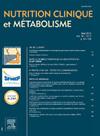Les répercussions bucco-dentaires des patients atteints de troubles du comportement alimentaire : mise au point et solutions préventives
IF 0.4
4区 医学
Q4 ENDOCRINOLOGY & METABOLISM
引用次数: 0
Abstract
Eating disorders such as anorexia nervosa, bulimia nervosa and binge eating disorder, are characterized by psychopathological disorders that affect patients’ relationship to food and their body perception. These disorders have repercussions on physical, mental and oral health. Oral manifestations include changes in the salivary glands, mucous membranes, periodontal tissues and teeth. Eating disorders can lead to poor oral health by altering salivary flow, increasing oral acidity and promoting the proliferation of pathogenic bacteria. Salivary pathologies, resulting from purging behaviors and the use of certain medications, can alter taste sensitivities and lead to hyposialia, a reduction in oral pH. Mucosal injuries are often caused by iatrogenic traumas, nutritional deficiencies, and chronic irritations that may require symptomatic treatment and vitamin supplementation. Nutritional deficiencies (vitamins C, D and B) have consequences on periodontal tissues, increasing the risk of periodontitis, tooth mobility and tooth loss. Dental lesions, such as erosions, cervical tooth wear and caries lesions, result from unbalanced eating behaviors and require rigorous oral hygiene, vitamin supplementation and an early intervention to avoid severe complications. The care of patients with eating disorders requires a multidisciplinary approach, especially with the oral health, involving regular visits to the dentist and preventive measures to improve patients’ quality of life.
饮食失调患者的口腔影响:发展和预防解决方案
神经性厌食症、神经性贪食症、暴食症等进食障碍以精神病理障碍为特征,影响患者与食物的关系和身体感知。这些疾病对身体、精神和口腔健康都有影响。口腔表现包括唾液腺、粘膜、牙周组织和牙齿的变化。饮食失调会改变唾液流动,增加口腔酸度,促进致病菌的繁殖,从而导致口腔健康状况不佳。由于排便行为和使用某些药物引起的唾液病变可改变味觉敏感性并导致唾液分泌不足,口腔ph值降低。粘膜损伤通常由医源性创伤、营养缺乏和慢性刺激引起,可能需要对症治疗和补充维生素。营养缺乏(维生素C、D和B)会对牙周组织造成影响,增加牙周炎、牙齿活动和牙齿脱落的风险。牙齿损伤,如糜烂、颈牙磨损和龋齿损伤,是由不平衡的饮食行为造成的,需要严格的口腔卫生、补充维生素和早期干预,以避免严重的并发症。饮食失调患者的护理需要多学科方法,特别是口腔健康,包括定期看牙医和采取预防措施,以提高患者的生活质量。
本文章由计算机程序翻译,如有差异,请以英文原文为准。
求助全文
约1分钟内获得全文
求助全文
来源期刊

Nutrition Clinique et Metabolisme
医学-内分泌学与代谢
CiteScore
0.80
自引率
16.70%
发文量
216
审稿时长
78 days
期刊介绍:
Nutrition Clinique et Métabolisme is the journal of the French-speaking Society of Enteral and Parenteral Nutrition. Associating clinicians, biologists, pharmacists, and fundamentalists, the articles presented in the journal concern man and animals, and deal with organs and cells. The goal is a better understanding of the effects of artificial nutrition and human metabolism. Original articles, general reviews, update articles, technical notes and communications are published, as well as editorials and case reports.
 求助内容:
求助内容: 应助结果提醒方式:
应助结果提醒方式:


